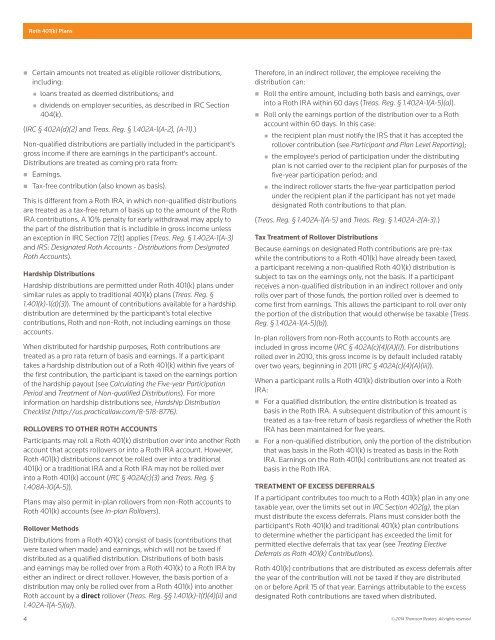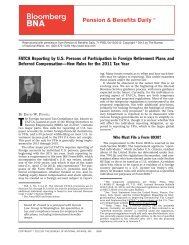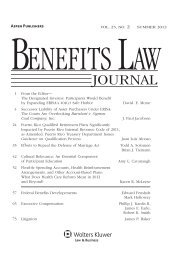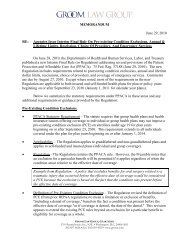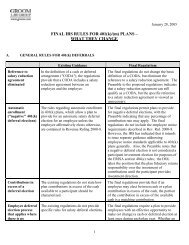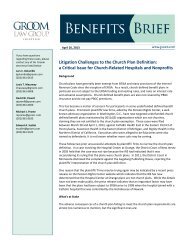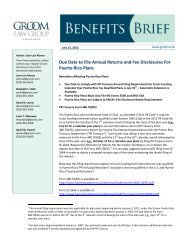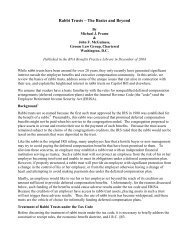Roth 401(k) Plans (PDF) - Groom Law Group
Roth 401(k) Plans (PDF) - Groom Law Group
Roth 401(k) Plans (PDF) - Groom Law Group
Create successful ePaper yourself
Turn your PDF publications into a flip-book with our unique Google optimized e-Paper software.
<strong>Roth</strong> <strong>401</strong>(k) <strong>Plans</strong><br />
• Certain amounts not treated as eligible rollover distributions,<br />
including:<br />
4<br />
• loans treated as deemed distributions; and<br />
• dividends on employer securities, as described in IRC Section<br />
404(k).<br />
(IRC § 402A(d)(2) and Treas. Reg. § 1.402A-1(A-2), (A-11).)<br />
Non-qualified distributions are partially included in the participant's<br />
gross income if there are earnings in the participant's account.<br />
Distributions are treated as coming pro rata from:<br />
• Earnings.<br />
• Tax-free contribution (also known as basis).<br />
This is different from a <strong>Roth</strong> IRA, in which non-qualified distributions<br />
are treated as a tax-free return of basis up to the amount of the <strong>Roth</strong><br />
IRA contributions. A 10% penalty for early withdrawal may apply to<br />
the part of the distribution that is includible in gross income unless<br />
an exception in IRC Section 72(t) applies (Treas. Reg. § 1.402A-1(A-3)<br />
and IRS: Designated <strong>Roth</strong> Accounts - Distributions from Designated<br />
<strong>Roth</strong> Accounts).<br />
Hardship Distributions<br />
Hardship distributions are permitted under <strong>Roth</strong> <strong>401</strong>(k) plans under<br />
similar rules as apply to traditional <strong>401</strong>(k) plans (Treas. Reg. §<br />
1.<strong>401</strong>(k)-1(d)(3)). The amount of contributions available for a hardship<br />
distribution are determined by the participant's total elective<br />
contributions, <strong>Roth</strong> and non-<strong>Roth</strong>, not including earnings on those<br />
accounts.<br />
When distributed for hardship purposes, <strong>Roth</strong> contributions are<br />
treated as a pro rata return of basis and earnings. If a participant<br />
takes a hardship distribution out of a <strong>Roth</strong> <strong>401</strong>(k) within five years of<br />
the first contribution, the participant is taxed on the earnings portion<br />
of the hardship payout (see Calculating the Five-year Participation<br />
Period and Treatment of Non-qualified Distributions). For more<br />
information on hardship distributions see, Hardship Distribution<br />
Checklist (http://us.practicallaw.com/8-518-8776).<br />
ROLLOVERS TO OTHER ROTH ACCOUNTS<br />
Participants may roll a <strong>Roth</strong> <strong>401</strong>(k) distribution over into another <strong>Roth</strong><br />
account that accepts rollovers or into a <strong>Roth</strong> IRA account. However,<br />
<strong>Roth</strong> <strong>401</strong>(k) distributions cannot be rolled over into a traditional<br />
<strong>401</strong>(k) or a traditional IRA and a <strong>Roth</strong> IRA may not be rolled over<br />
into a <strong>Roth</strong> <strong>401</strong>(k) account (IRC § 402A(c)(3) and Treas. Reg. §<br />
1.408A-10(A-5)).<br />
<strong>Plans</strong> may also permit in-plan rollovers from non-<strong>Roth</strong> accounts to<br />
<strong>Roth</strong> <strong>401</strong>(k) accounts (see In-plan Rollovers).<br />
Rollover Methods<br />
Distributions from a <strong>Roth</strong> <strong>401</strong>(k) consist of basis (contributions that<br />
were taxed when made) and earnings, which will not be taxed if<br />
distributed as a qualified distribution. Distributions of both basis<br />
and earnings may be rolled over from a <strong>Roth</strong> <strong>401</strong>(k) to a <strong>Roth</strong> IRA by<br />
either an indirect or direct rollover. However, the basis portion of a<br />
distribution may only be rolled over from a <strong>Roth</strong> <strong>401</strong>(k) into another<br />
<strong>Roth</strong> account by a direct rollover (Treas. Reg. §§ 1.<strong>401</strong>(k)-1(f)(4)(ii) and<br />
1.402A-1(A-5)(a)).<br />
Therefore, in an indirect rollover, the employee receiving the<br />
distribution can:<br />
• Roll the entire amount, including both basis and earnings, over<br />
into a <strong>Roth</strong> IRA within 60 days (Treas. Reg. § 1.402A-1(A-5)(a)).<br />
• Roll only the earnings portion of the distribution over to a <strong>Roth</strong><br />
account within 60 days. In this case:<br />
• the recipient plan must notify the IRS that it has accepted the<br />
rollover contribution (see Participant and Plan Level Reporting);<br />
• the employee's period of participation under the distributing<br />
plan is not carried over to the recipient plan for purposes of the<br />
five-year participation period; and<br />
• the indirect rollover starts the five-year participation period<br />
under the recipient plan if the participant has not yet made<br />
designated <strong>Roth</strong> contributions to that plan.<br />
(Treas. Reg. § 1.402A-1(A-5) and Treas. Reg. § 1.402A-2(A-3).)<br />
Tax Treatment of Rollover Distributions<br />
Because earnings on designated <strong>Roth</strong> contributions are pre-tax<br />
while the contributions to a <strong>Roth</strong> <strong>401</strong>(k) have already been taxed,<br />
a participant receiving a non-qualified <strong>Roth</strong> <strong>401</strong>(k) distribution is<br />
subject to tax on the earnings only, not the basis. If a participant<br />
receives a non-qualified distribution in an indirect rollover and only<br />
rolls over part of those funds, the portion rolled over is deemed to<br />
come first from earnings. This allows the participant to roll over only<br />
the portion of the distribution that would otherwise be taxable (Treas.<br />
Reg. § 1.402A-1(A-5)(b)).<br />
In-plan rollovers from non-<strong>Roth</strong> accounts to <strong>Roth</strong> accounts are<br />
included in gross income (IRC § 402A(c)(4)(A)(i)). For distributions<br />
rolled over in 2010, this gross income is by default included ratably<br />
over two years, beginning in 2011 (IRC § 402A(c)(4)(A)(iii)).<br />
When a participant rolls a <strong>Roth</strong> <strong>401</strong>(k) distribution over into a <strong>Roth</strong><br />
IRA:<br />
• For a qualified distribution, the entire distribution is treated as<br />
basis in the <strong>Roth</strong> IRA. A subsequent distribution of this amount is<br />
treated as a tax-free return of basis regardless of whether the <strong>Roth</strong><br />
IRA has been maintained for five years.<br />
• For a non-qualified distribution, only the portion of the distribution<br />
that was basis in the <strong>Roth</strong> <strong>401</strong>(k) is treated as basis in the <strong>Roth</strong><br />
IRA. Earnings on the <strong>Roth</strong> <strong>401</strong>(k) contributions are not treated as<br />
basis in the <strong>Roth</strong> IRA.<br />
TREATMENT OF EXCESS DEFERRALS<br />
If a participant contributes too much to a <strong>Roth</strong> <strong>401</strong>(k) plan in any one<br />
taxable year, over the limits set out in IRC Section 402(g), the plan<br />
must distribute the excess deferrals. <strong>Plans</strong> must consider both the<br />
participant's <strong>Roth</strong> <strong>401</strong>(k) and traditional <strong>401</strong>(k) plan contributions<br />
to determine whether the participant has exceeded the limit for<br />
permitted elective deferrals that tax year (see Treating Elective<br />
Deferrals as <strong>Roth</strong> <strong>401</strong>(k) Contributions).<br />
<strong>Roth</strong> <strong>401</strong>(k) contributions that are distributed as excess deferrals after<br />
the year of the contribution will not be taxed if they are distributed<br />
on or before April 15 of that year. Earnings attributable to the excess<br />
designated <strong>Roth</strong> contributions are taxed when distributed.<br />
© 2014 Thomson Reuters. All rights reserved.


